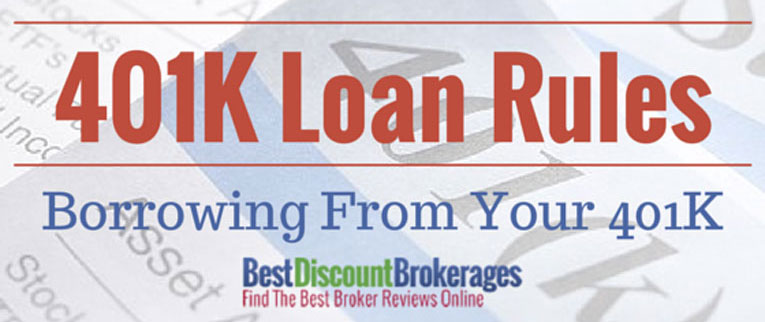401K loan rules can be complicated. But if you need to borrow money for whatever reason, accessing your 401(k) funds is generally an option for important loans or emergency cash (so long as your 401(k) provider doesn’t have a clause against loans). The IRS dictates that you may withdraw money tax-free for a specified amount of time (longer, if the money is being used for a down payment on your primary home). If not repaid within the specific time-frame, you may run the risk of incurring the early distribution taxation (which occurs when you withdraw from your 401k prior to reaching the age of 59 ½).
Although it’s not a requirement that the loan be taken out for emergency purposes, borrowing from your 401k is generally advised against because of the potential negative implications involved (such as the aforementioned risk of early distribution taxation and the opportunity cost of spending that money when it could have been left to grow its value in various investments).
Below, we’ll discuss the many 401K borrowing and repayment rules and provide guidelines to loaning yourself money from this retirement account!
Pros and Cons of Borrowing
Is borrowing from your 401(k) worth the potential downfalls? Let’s examine the process and analyze the advantages and disadvantages.
Credit Check
Because the money you’re borrowing is already your designated retirement money (and not from an external loan source), there is no need to check your credit.
Application Process
Because a loan from your 401(k) is unlike traditional loans, not only will you avoid the hassle of a credit check, but the application process is smoother as well. Generally there is less paperwork, less waiting, and lower application fees associated with 401(k) loans (if there are any fees involved in the transaction—it depends on your 401(k) provider).
Time Frame and Borrowing Limits
According to the guidelines on the Internal Revenue Service’s website, a loan from a 401(k) account is not taxable if it meets the criteria:
“Generally, if permitted by the plan, a participant may borrow up to 50% of his or her vested account balance up to a maximum of $50,000. The loan must be repaid within 5 years, unless the loan is used to buy the participant’s main home. The loan repayments must be made in substantially level payments, at least quarterly, over the life of the loan.”
When it comes to outstanding loans and repayment of the original loans, the IRS further adds that the participant must make significant efforts to decrease the $50,000 outstanding from the first loan within the 12 month period that ends the day before the loan must be paid in full. Also: “The amount of the reduction is the participant’s highest outstanding loan balance during that period minus the outstanding balance on the date of the new loan.”
Pros
Because there is no credit check, the hassle of the entire process is lessened and it’s easier to “qualify” for these loans because taking out a 401(k) loan is simply withdrawing your own funds, albeit prematurely. There is likely less paperwork involved and processing times are faster than the traditional loan route.
Interest Rates
And what about interest rates? Unlike other loan sources, the interest rate (generally around 5% or the usual consumer going rate at the time) on your 401(k) loans is paid back to you. Despite the negative connotation attached to interest rates in other financial arenas (mortgages, credit cards, student loans, etc.), borrowing from your 401(k) means you’ll be paying interest back to yourself instead of a bank or loan administrator.
Taxes
Although there is the “double taxation” dilemma to consider (where you’re paying back interest into a taxable account with money you already paid taxes on), the total amount is usually minimal and outweighs the costs of borrowing from a bank (which would incur application fees and interest that isn’t paid back to you).
Cons
While excellent for emergency situations, the problem with borrowing from your 401(k) is that it can create bad financial habits. Regardless of the convenience and low-cost factors, borrowing from your 401(k) should be used as a last resort because it’s not worth gambling your retirement unless you’re in a dire financial situation to begin with (or want to purchase a home, in which case, you’re not only buying yourself more time to repay the loan, but you’re investing in an asset that can support you in your retirement years).
However, if you’re simply borrowing so you can buy a new car or go on vacation, weigh this decision very carefully beforehand because if you’re unable to pay back the loan on time (usually within 60 days if you leave your previous place of employment; longer if the terms are different), then you run the risk of 401(k) early distribution.
Early distribution means that your 401(k) is no subject to both state and federal income taxes, as well as a 10% early withdrawal penalty if you’re under age 59 ½.
Opportunity Costs
And what of opportunity costs? By withdrawing funds from your 401(k) plan, you miss out on other investment opportunities while you’re out spending the money (which, even though it’s your money, you’ll eventually have to repay). Excluding the purchase of a home, there are few investment opportunities as valuable as simply leaving the money where it is, thus building your long-term returns on your retirement funds.
401K Loans
When it comes to borrowing from your 401(k), there are obviously many things to take under consideration. While it may seem that you have thousands of dollars at your disposal, do consider that you could be putting your future retirement at risk if you fail to pay off the loan in a timely manner. For best results, be sure to carefully weigh the advantages and disadvantages prior to borrowing from your 401(k) and prioritize paying back this loan as soon as possible to avoid the risk of premature distribution penalties.
